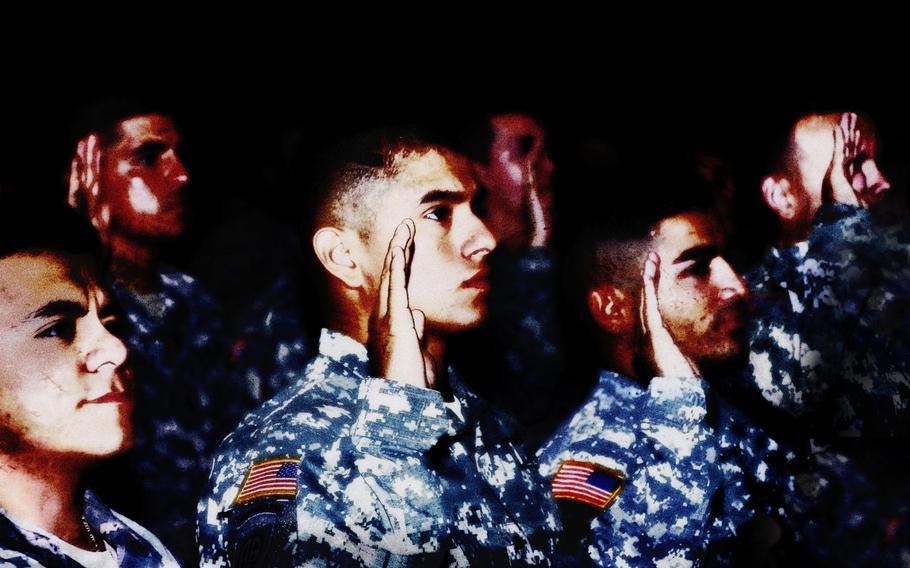
(Noga Ami-rav/Stars and Stripes illustration)
WASHINGTON -- After more than a year of essential lockdown for noncitizen military recruits stuck in entry training programs, the Army has issued a policy memo loosening restrictions on privileges for these soldiers in recognition of their status, performance and conduct.
The memo was issued March 30 — just days after Stars and Stripes began asking questions about the soldiers in the Military Accessions Vital to National Interest, or MAVNI, program who have been held over at basic or initial job training since late 2016, when the Defense Department began requiring enhanced security vetting for them.
An Army spokesman said the memo “should leave no doubt” that these MAVNI holdovers should enjoy “full privileges.”
The policy change appears aimed at commanders, spelling out that these soldiers should be given privileges in keeping with a permanent assignment to the unit. Brigade commanders of MAVNI holdovers are now “authorized to modify the privileges” for these soldiers at initial training units, according to the document.
“Privileges should be based on individual performance and conduct and must include privileges to permanently assigned soldiers,” said the “Change 2, Exception to Policy for MAVNI Trainees and Soldiers in Initial Entry Training” memo, signed by Maj. Gen. Malcolm Frost, commander of the Army’s Center for Initial Military Training. The Army released the memo to Stars and Stripes on Friday.
Asked whether they were seeing any improvements, some MAVNIs told Stars and Stripes that their situation remains the same. Others said they’d seen improvements based on the new policy.
Since 2009, more than 10,000 MAVNI soldiers were recruited because their backgrounds and talents, particularly their language or medical skills and their cultural knowledge filled a critical need for the Army. In exchange, they were offered a promise of professional advancement and a fast track to citizenship. But growing national security concerns led the Defense Department in fall 2016 to institute enhanced security screenings for these foreigners, casting a shadow of suspicion on the group and creating a backlog. MAVNI soldiers who were recruited in the months leading up to that time were stuck waiting for the completion of security checks at whatever stage of entry they’d reached. No MAVNI soldiers have been recruited since the vetting was introduced.
Shortly after the enhanced screenings were put in place, the Army issued a “stop move” order barring MAVNIs who’d been held over in early training from traveling until their security investigations were complete, according to earlier Army memos. The memos outlined levels of privileges based on the training level of the recruits and whether they were naturalized.
At bases across the country, “holdovers” told Stars and Stripes they were living under very restrictive rules — many for more than a year — at units that are supposed to host soldiers for just weeks or months. They were given few privileges and granted limited movements even on base. and they were not able to work in their professional fields or practice their skills.
A June 2017 memo clarified that non-naturalized MAVNI holdovers could be approved for leave within the United States based on the discretion of their commander. But most MAVNIs contacted last month said they were stuck on base or given very limited allowances to leave with a buddy. Some were required to have a buddy even to walk across the installation. Traveling outside the country was prohibited except for extreme cases after a staff judge advocate review, the memos stated.
The policy memo released in March states that in December 2017, staff at the Center for Initial Military Training had “reevaluated the current MAVNI privilege policy” with input from the brigade commander and the assistant secretary of the Army for manpower and reserves.
“This Change 2 is effective immediately and supersedes Change 1 dated 20 June 2017,” the document states.
In addition to easing restrictions on movement, the change also included allowing the consumption of alcohol. Under the prior memo, MAVNIs were prohibited from drinking alcohol regardless of age.
In earlier reporting, the Department of Defense declined to comment on the situation, citing ongoing litigation. There are at least two class-action lawsuits against the Defense Department filed by MAVNI Army reservists, but those lawsuits are limited in scope and do not include all MAVNIs, including those on active duty.
In supplying the most recent memo, Army Lt. Col. Jeffrey Pray, the public affairs officer for the Center for Initial Military Training, indicated in an email that the 2017 change to policy was meant to alleviate some of the hardship on the MAVNIs. He said the latest memo should fully clarify that.
Center for Initial Military Training policy “grants full privileges to all MAVNI Soldiers who are in a hold status in the Initial Military Training enterprise,” Pray wrote. “CIMT issued this policy in 2017 and recently updated it to leave no doubt that MAVNI Soldiers are authorized full privileges.”
cahn.dianna@stripes.com Twitter: @DiannaCahn